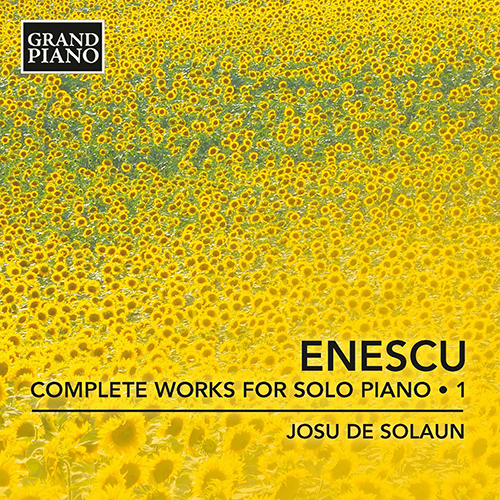
About this Release
“Discovering Enescu´s music was a personal landmark event in my personal biography. I felt, for the first time since discovering "the greats” in my childhood - Bach, Beethoven, Mozart - that I was in the presence of one of the most fascinating minds in the history of music. His work moved me deeply and has left a profound footprint in my consciousness: its infinite richness and multi-layered craftsmanship, its message of hope, the depth of its utterance. I will never be the same after it.” — Josu de Solaun
ENESCU, GEORGE (1881–1955)
Complete Works for Solo Piano • 1
- Josu de Solaun, piano
This first of three discs devoted to George Enescu’s piano music presents three significant pieces. Indebted to Romanian folk music and in three large sections, the ruminative yet striking Nocturne in D flat is a work of shifting sonorities and moods. The Pièces impromptues, Op. 18 are independent, unrelated character pieces that illuminate once again the composer’s fascination with the indigenous music of Romania. The Sonata No. 1 in F sharp minor, Op. 24, No. 1 is – by contrast – a massive statement characterised by harmonic surprises, innovative techniques, insistent rhythms and, in the final, slow movement, the doina, a type of Romanian song at once contemplative, nostalgic and melancholic.
This recording was made on a modern instrument: Shigeru Kawai
Tracklist
|
1
Nocturne in D-Flat Major (1907) (00:19:07)
|
|
Pièces impromptues, Op. 18, "Suite No. 3" (1916) (00:25:00 )
|
|
2
I. Mélodie (00:03:15)
|
|
3
II. Voix de la steppe (00:03:20)
|
|
4
III. Mazurk mélancolique (00:05:28)
|
|
5
IV. Burlesque (00:05:34)
|
|
6
V. Appassionato (00:04:51)
|
|
7
VI. Choral (00:07:16)
|
|
8
VII. Carillon nocturne (00:06:52)
|
|
Piano Sonata No. 1 in F-Sharp Minor, Op. 24, No. 1 (1924) (00:25:00 )
|
|
9
I. Allegro molto moderato e grave (00:11:05)
|
|
10
II. Presto vivace (00:04:40)
|
|
11
III. Andante molto espressivo (00:07:38)
|
The Artist(s)
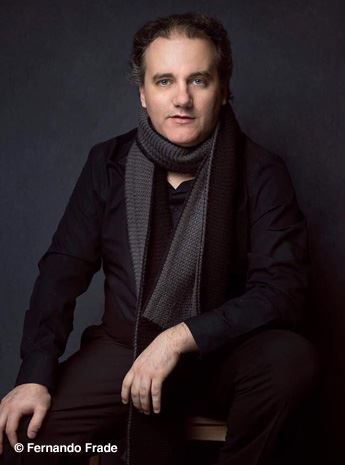
Pianist Josu De Solaun is the First Prize winner of the XIII George Enescu International Piano Competition in Bucharest (previous winners include the legendary pianists Radu Lupu and Elisabeth Leonskaja) and the XV José Iturbi International Piano Competition. He has been invited to perform in distinguished concert series throughout the world, having made notable appearances in Bucharest (Romanian Athenaeum), St Petersburg (Mariinsky Theatre), Washington DC (Kennedy Center), New York (Carnegie Hall, Metropolitan Opera), London (Southbank Centre), Paris (Salle Cortot), Mexico City (Sala Silvestre Revueltas), and all major cities of Spain.
www.josudesolaun.com
The Composer(s)
 In the vast Eastern European diaspora of 20th Century music, few composers can claim the audacity and originality of George Enescu. Enescu was barely in his teens when he commanded the attention of Europe’s musical aristocracy as a virtuoso violinist. In 1895 he entered the Paris Conservatory, where he cultivated his compositional gifts as a student of Fauré and Massenet, astounding all who knew him with his consummate virtuosity at the piano, cello, and organ as well. For nearly a half century the name Enescu was on the lips of every major concert artist. Among them were his classmate at the Conservatoire, Alfred Cortot, his godson Dinu Lipatti; Gustav Mahler, his student Yehudi Menuhin, David Oistrakh, and Clara Haskil, to name only a few.
In the vast Eastern European diaspora of 20th Century music, few composers can claim the audacity and originality of George Enescu. Enescu was barely in his teens when he commanded the attention of Europe’s musical aristocracy as a virtuoso violinist. In 1895 he entered the Paris Conservatory, where he cultivated his compositional gifts as a student of Fauré and Massenet, astounding all who knew him with his consummate virtuosity at the piano, cello, and organ as well. For nearly a half century the name Enescu was on the lips of every major concert artist. Among them were his classmate at the Conservatoire, Alfred Cortot, his godson Dinu Lipatti; Gustav Mahler, his student Yehudi Menuhin, David Oistrakh, and Clara Haskil, to name only a few. Reviews

“…whether because of the unusual programme or the superb interpretations offered by Solaun, we are faced with a collection of music that needs to be listened to, an essential album that promises to delight even the most demanding music lover. ” – Melómano (Spain)

“Full recommendation for these completely outstanding albums, thanks to the indisputable merit of a communicator who is so thoroughly engaged with the music he plays.” – Scherzo

“[…] Josu de Solaun makes a seriously persuasive case for the varied and absorbing piano music in these three discs. […] De Solaun never makes heavy weather of Enescu’s demanding writing, but lets expression lead at all times, no matter how intense the virtuosity. There’s a bouncy vitality to his playing, a warm and intimate approach to phrasing and beautifully mellow tone quality.” – BBC Music Magazine
“…the upper voice (right hand) makes the notes sound as bright and clear as if precious pearls were presented on a velvet cloth. In contrast, the left hand bursts as an indeterminate threat in the deepest depth, which is supported by the extensive use of the pedal. The interpretation is never mawkish, despite great sound variations, but always stays under control.” – www.klassik.com
“De Solaun’s technique is excellent ” – American Record Guide

“I assure you that the results of this album are amazing.” – Ritmo
“Winner of both the Enescu and Iturbi International Piano Competitions, the Spanish pianist, Josu De Solaun brings clarity to Enescu’s density and shape where it is all too easy to meander. The first of three discs, the sound is outstanding, and I ask you to explore a unique musical voice that is unjustly neglected.” – David Denton

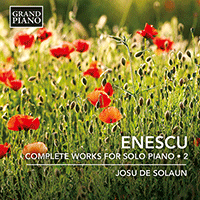
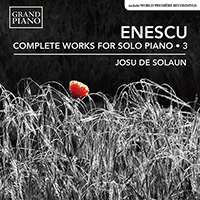
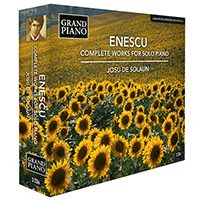
 Grand Piano has gained a reputation for producing high quality recordings of rare keyboard gems. Dedicated to the exploration of undiscovered piano repertoire, the label specialises in complete cycles of piano works by many lesser-known composers, whose output might otherwise have remained unknown and unrecorded.
Grand Piano has gained a reputation for producing high quality recordings of rare keyboard gems. Dedicated to the exploration of undiscovered piano repertoire, the label specialises in complete cycles of piano works by many lesser-known composers, whose output might otherwise have remained unknown and unrecorded.






